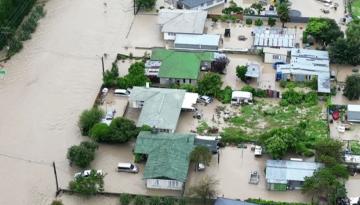
When floods hit the eastern Australian town of Lismore two years ago, Adam Bailey lost all the historic collections from his antique store, including rare photos of the Dardanelles taken during World War One.
Now, when it rains at night, he can't sleep. If he wants to insure his new store and its contents at a nearby location, he needs to fork out almost A$80,000 ($53,272.00) - peace of mind he says he cannot afford.
"I have got no insurance at all - if the flood was to come again that would be it for me," said Bailey, a Lismore resident since 1988 who now lives upstairs from his new store.
The deadly floods knocked 30% off the prices of low-lying properties in Lismore, a town of 44,000, and reflect the growing risks climate-related disasters pose to hot real estate markets Down Under as dwellings and businesses in affected areas become harder to insure.
Policymakers, researchers and property experts warn climate change is a risk that home buyers in Australia and New Zealand have not priced in as they pursue lifestyles near the water or bushland or seek simply to get onto the property ladder.
Natural disasters could wipe about A$800 billion off Australia's housing market by 2030 or about 6.7% of the total value, climate risk specialist XDI said in data shared with Reuters.
In New Zealand, around 20% of houses are on floodplains, according to research by Climate Sigma.
"Can the economy ride that out? Maybe. Will certain communities suffer more than others? Yes. So you might have very significant community impacts," said Karl Mallon, director of science and technology at XDI.
"When these events come through, they affect businesses and they affect the wider economy."
While climate change is a growing risk for real estate worldwide, Australia's and New Zealand's housing obsessions have led to record prices and personal wealth piling into sprawling homes built near waterways and coastlines, amplifying the threat to the economy, banks and the people.
Among OECD nations, Australians have the second-highest amount of wealth in real estate in mean U.S. dollar terms while New Zealand also ranks above average.
For now, there are few signs of systemic problems in the housing economy because of climate risks.
However, pockets of pain are springing up, such as Lismore, where land prices halved and locals told Reuters many people have left town with flood cover increasingly out of reach.
Across the Tasman Sea, the coastal settlement of Haumoana near some of New Zealand's best wineries on the east coast of the North Island is one of the first communities to bear the brunt of inundation.
Earlier this year, a beachfront property was listed for sale with a starting bid of NZ$1. It sold for NZ$100,000 ($61,310.00), less than half its local government value, in part because the house on the site was pulled down.
Research by Australian property website Domain showed each increase in bushfire risk rating decreased a home's value by 2%, while each percentage point rise in the chance of a 50-centimetre flood led to an 0.8% drop in the property's value.
INSURANCE WOES
Insurance premiums for climate risk are reaching a point where some homeowners can no longer afford to protect their homes, industry experts say.
In an ongoing government inquiry, top insurer Allianz Australia revealed about 74% of customers with the highest flood rating did not purchase flood cover last year, up from 63% before. For some highly exposed communities, such as the river regions around Lismore, 90% had no flood cover.
Climate Council expects 4% of Australian properties will be uninsurable by 2030. In the first quarter of the year, insurance premiums surged 16.4% - the biggest annual increase in 23 years.
In New Zealand, around 1,000 properties are uninsurable and being bought by authorities following major floods in 2023.
Insurance premiums have doubled in the past 10 years due to growing climate risk and high construction costs, Kerry Watt, director of financial stability assessment and strategy at the Reserve Bank of New Zealand.
"What we would like people to do is to start to take more notice of the specific risks to the properties they might be buying," Watt said.
PARTY ON?
To be sure, quantifying the exact impact of natural disaster risk on property prices is obscured by other factors, chiefly demand and mortgage rates.
Data from property consultant CoreLogic showed in most flood prone or coastal markets in Australia, home prices have reclaimed previous peaks. Even in Lismore, mortgage brokers say rich investors are scooping up properties at huge discounts.
For some buyers the risks are outweighed by the desire to live near water.
"I love water sports and boating," said Jack Henderson, a property investor whose plan of turning a block of land along the Hawkesbury river in Sydney to a holiday home was thwarted by record flood in 2022.
"If you want to have a property that's literally on the water, then unfortunately it's (flooding) something that's sort of unavoidable."
($1 = 1.6311 New Zealand dollars)
($1 = 1.5017 Australian dollars)
Reuters


